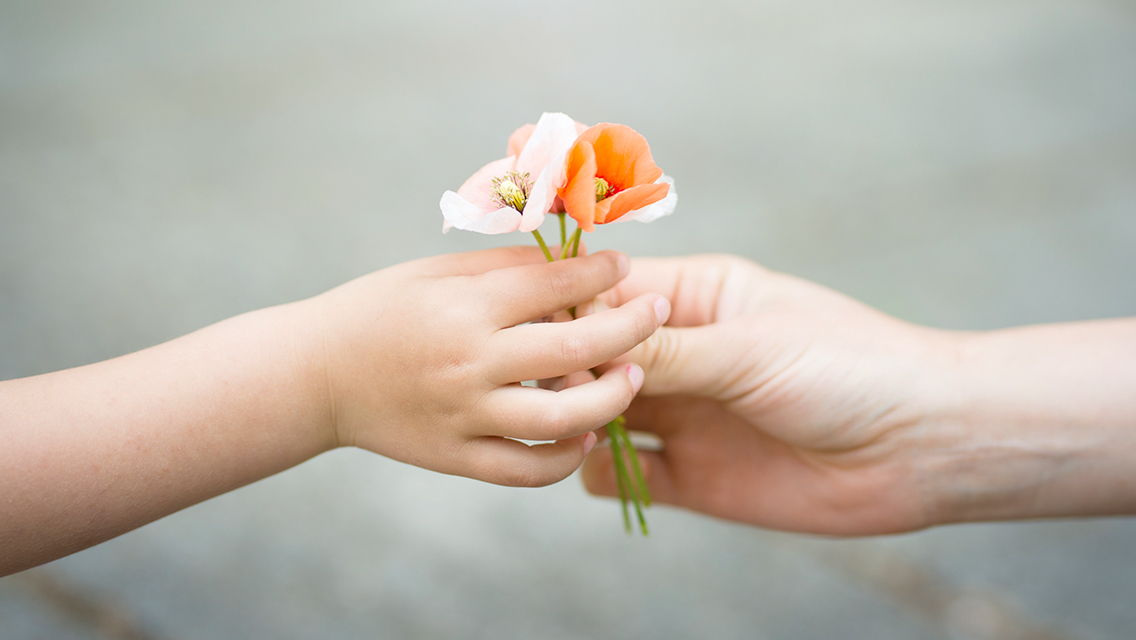Treating other people well isn’t just good for your karma: It’s also a boost for your mental and physical health. And because small gestures have big importance, practicing kindness is an easy means to support your health.
Explore this article:
1. Adjust your automatic responses.
2. Put your hand on your heart.
3. Shift your focus to what’s working.
4. Differentiate between obligations and opportunities.
5. Respect those you help.
6. Be mindful of the money effect.
7. Start at home.
8. Remember that kindness is a practice, not a project.
Psychology researcher Barbara Fredrickson, PhD, author of Love 2.0: Creating Happiness and Health in Moments of Connection, studies how “micro-moments” of connection with others, like sharing a smile or expressing concern, help to improve emotional resilience, boost the immune system, and reduce susceptibility to depression and anxiety.
In Fredrickson’s view, our psyches need affirmative human connection in much the same way that our bodies need wholesome food. “Moments of uplifting positive emotions function like nutrients for creativity, growth, and health,” she explains.
Meanwhile, moods happen. While none of us wakes up with the intention to curse at our spouse or shame our work colleague, we do — probably more often than any of us would like.
According to psychologist Elisha Goldstein, PhD, author of Uncovering Happiness: Overcoming Depression with Mindfulness and Self-Compassion, unwelcome outbursts may be at least partly attributable to our brains’ “negativity bias,” which encourages us to favor cautious, fear-based thoughts over generous, positive ones.
We evolved this defense mechanism to protect us from lurking danger, he notes, but it doesn’t protect our relationships very well. And in this moment, when we’re still trying to figure out life in a pandemic-altered world, our primal survival behaviors are triggered routinely.
This can make us fearful and anxious about lacking what we need, something that was true even before COVID-19. “We live in a kind of fundamental scarcity,” explains Kristi Nelson, MPA, executive director of A Network for Grateful Living, a Massachusetts-based nonprofit that promotes gratitude practice. “That sense of scarcity tends to run our lives.”
It also leads to perpetual rushing, which only makes matters worse. Even if we’ve slowed down and are staying at home more than we once did, we may still rush to seek all the answers, to know what’s coming next, to figure everything out. And we can be pretty hard on ourselves and others when this isn’t possible.
Under this kind of pressure, the very idea of practicing kindness — keeping the needs and feelings of others in mind, showing care and empathy — can seem like a luxury at best. At worst, it just seems foolish.
Yet the act of focusing on others can actually reduce our eat-or-be-eaten anxieties because it improves our health and well-being.
In 2013 Fredrickson conducted a six-week study at the University of North Carolina at Chapel Hill that measured the effects of meditation on stress. Instead of focusing on a mantra or the sound of the breath, participants were instructed to meditate on compassionate thoughts toward themselves and others — including people they disliked.
After six weeks, researchers studied the effects of the practice on each participant’s vagus nerve, which stimulates the parasympathetic nervous system to regulate digestion and cardiovascular health. Those who reported more positive feelings and social connections also displayed improved vagal tone.
This research shows that even if you’re habitually cautious or cranky, there’s hope. Kindness does get easier — with practice.
And when we are kind to others, says Goldstein, our mental habits of scarcity, negativity, and rigidity begin to shift. We feel less worried about getting our share, and that leaves more goodness on the table for everyone to enjoy.
Cultivating Kindness
Strategies for growing compassionate connections with yourself and others.
1. Adjust your automatic responses.
Stress triggers us to act in unkind ways — cursing the driver who cut us off, snapping at our kids when they’re slow to get dressed. Then we might feel guilty, which creates more stress.
“We get stuck in these anxious, negative loops,” says Goldstein. “So we seek out comfort where we can find it, and end up overeating, or paying too much attention to our smartphones, or otherwise constantly trying to distract ourselves.”
We can shift these automatic tendencies by consciously building new ones. “When you have awareness that you want to be kind, and then you practice it, you’re essentially rewiring the compassionate part of your mind,” Goldstein says. “The brain has the wonderful ability to make things automatic.”
He suggests redirecting your focus when you notice an irritating thought. Don’t try to be kind right away; it will only annoy you more. Instead, take a breath and check out the situation; see if you do have what you need and are basically OK.
You might discover that you still have time to get where you’re going, despite your pokey kids. Or you might realize that you are going to be late, but fuming only adds to the stress. That may be all it takes to call off the state of alarm and shift your mind into a friendlier mode.
2. Put your hand on your heart.
This technique seems almost too simple to work, and yet it’s been shown to create a sense of compassion and empathy, says University of Texas associate professor Kristin Neff, PhD, author of Self-Compassion: The Proven Power of Being Kind to Yourself.
“It seems weird at first, when you start practicing this,” Neff admits. “But your mammalian system kicks in immediately when you place your hand on your heart. You begin to use a warmer, gentler tone with yourself and with others.”
“Often, kindness is just about stopping in your tracks and becoming aware of what you have.”
Our physiology appears hardwired to recognize this gesture as self-soothing. Trauma expert Peter Levine, PhD, theorizes that the hand-on-heart exercise works because the human nervous system is responsive to touch; like babies, we respond to being held by relaxing and calming down. That touch also brings us back into connection with our bodies and, in particular, our breath.
3. Shift your focus to what’s working.
Cultivate a sense of satisfaction whenever possible, advises Nelson. Even when life is a chaotic mess and you’re certain that you’re not getting the love, respect, or paycheck you deserve, just take a step back to identify a few good things in your life.
“Often, kindness is just about stopping in your tracks and becoming aware of what you have,” she says.
Feel free to cultivate gratitude for large-scale blessings like health and love, but a more helpful inventory might include overlooked gifts like clean water from the tap, warm clothes, even the ability to read these words.
Nelson calls seeking and naming these fundamental gifts “the radical commitment to take nothing for granted.” When life feels abundant, it’s easier to be generous and avoid the trap of scarcity thinking.
4. Differentiate between obligations and opportunities.
Most of us have schedules, calendars, and other tools to keep us on track. Unfortunately, the quest to accomplish things can take precedence over our interactions with others. Marketing meeting: done. Oil change and brake repair: scheduled. Phone call with friend to talk about her divorce: check. What’s next on the day’s agenda?
“Many people are so wrapped up with their to-do lists that they treat people as obstacles, or as a means to some end that’s related to achievement,” says Fredrickson. “Why not slow down and really spend time in someone’s company? To do so is a gift to both you and the other person.”
Simply being present with other people — not checking your phone, not rushing to deliver advice as soon as someone starts describing a problem, not scheduling social engagements back to back — can have profound effects, adds Goldstein.
He recalls one of his mindfulness students relating an anecdote about dinner with friends. Instead of thinking about what she had to do next, she focused on the conversation.
“Her friends noticed immediately, and they felt grateful,” he says. “That one decision had a ripple effect, where everyone there began showing each other more kindness.
“That’s what happens when we’re truly present with each other. You inspire other people to do the same for you.”
5. Respect those you help.
Giving to those in need can be a beautiful act, but how you think about that gesture is important, says Nelson. She believes generosity is noble, but the notion of “charity” is inherently limiting: It can ignore how much we have in common with those we aim to help.
“Humility is one of the key ingredients to kindness,” she states. “When you’re being kind because you believe you’re better than someone else and they need your pity, then giving is less meaningful.”
Whatever the action — volunteering at a food shelf, donating to a homeless shelter, or comforting a friend — there’s a difference between being kind out of a sense of respect and doing it because you believe the other person is somehow insufficient and has nothing to offer you in return.
“Pity sets up a hierarchy,” she explains. “It leads to us projecting our needs onto other people, not seeing what they truly need.”
Instead, she advises, remember that we all are vulnerable and need help at different times. And notice how the goodness of generosity flows in all directions. It feels great to give; you get something out of the interaction, too.
6. Be mindful of the money effect.
As Nelson points out, a preoccupation with acquiring material wealth can lead to unconscious unkindness. But even having money on our minds (which can be hard not to do if we’re struggling financially or habitually preoccupied with wealth) can be enough to make us less friendly.
In a fascinating set of experiments, researchers primed one set of subjects to think about money, showing them phrases related to wealth, screensavers with pictures of dollar bills, and more. They primed another group with neutral imagery.
The money-primed subjects underwent two observable changes: First, they became more self-reliant and less likely than the other group to ask for help. Second, they became markedly less inclined to offer help to others in need.
In one experiment, for example, a researcher walked through the room and spilled a bunch of pencils. The subjects who’d been primed to think about money consistently offered less assistance, picking up far fewer pencils than the other group.
For Nelson, overcoming the influence of money on our behavior involves staying conscious of our scarcity mentality. “That sense of scarcity is insidious,” she says, “and it takes engagement and mindfulness to run counter to that.”
Once again, reminding yourself that you do have enough — even if your resources are modest — is a powerful tool for creating a mindset of kindness and consideration.
7. Start at home.
Any positive interaction boosts our baseline well-being, Fredrickson notes, but it’s good to bring our kindness practice home, not least because it can be more difficult to be cheerful and caring with the people we see routinely — the ones who occasionally annoy us, bore us, or disrespect us.
If we can rise to that challenge, we know we’re really growing.
“When we think about kindness, we often imagine these grand gestures, but we don’t need to join the Peace Corps to create more compassion in our lives,” says Nelson. “Start by looking closer to home. How do you treat the people you live with?”
8. Remember that kindness is a practice, not a project.
In any quest to practice kindness, challenges are inevitable. Someone will always be driving slow in the fast lane or passing on the right. Mean-spirited gossip will forever be circulating. There will be lines, angry online commenters, personal upheavals. There will be major difficulties of all kinds. That is life.
“It’s better to see kindness as a playful adventure rather than a project that needs to get accomplished,” says Goldstein. “You’re trying to rewire yourself for a greater sense of well-being and purpose in the world, and that requires some lightness in your attitude. Once you become too aggressive or serious about it, then you’re going the wrong way.”
One trap many of us fall into is thinking of kindness as an achievement, he explains. There’s an illusion of an endpoint: I did all the right things, so now I can check “being kind” off my to-do list. Goldstein suggests a better approach: Pay attention to what causes us to stray from the intention to be kind, and then gently direct ourselves back to the path.
“You can cultivate kindness,” he says, “by simply inviting yourself to begin again.”
“How Kind Are You?” Quiz
Our brains have a negativity bias, which predisposes us to fear-based, kindness-killing behaviors like rushing and defensiveness, explains Elisha Goldstein, PhD. But we can develop habits to help override those impulses. This exercise helps reveal which pro-kindness habits you’ve already mastered — and which might deserve more of your conscious attention.
Not At All Like Me |
A Little Like Me |
Mostly Like Me |
Exactly Like Me |
|
| 1. I am rarely in a hurry | ||||
| 2. When I’m irritated, I know how to sooth myself. | ||||
| 3. I feel grateful for the food fortune in my life. | ||||
| 4. My cellphone is out of sight during dinner with others. | ||||
| 5. People describe me as a good listener. | ||||
| 6. I like to help others. | ||||
| 7. Receiving help is comfortable for me. | ||||
| 8. I feel like I have what I need most of the time. | ||||
| 9. The people I live with feel appreciated by me. | ||||
| 10. What I make mistakes, I know I can always start over. |
Assess yourself: If you checked mostly “Exactly like me” or “Mostly like me,” you’re probably generally inclined toward kindness. Answers of “Not at all like me” or “A little like me” show where you have room for improvement.
This originally appeared as “The Power of Kindness” in the May 2015 print issue of Experience Life.




This Post Has One Comment
There is no info on interpreting quiz results….